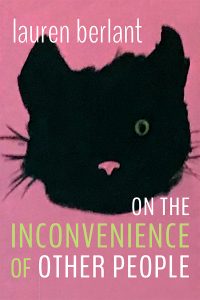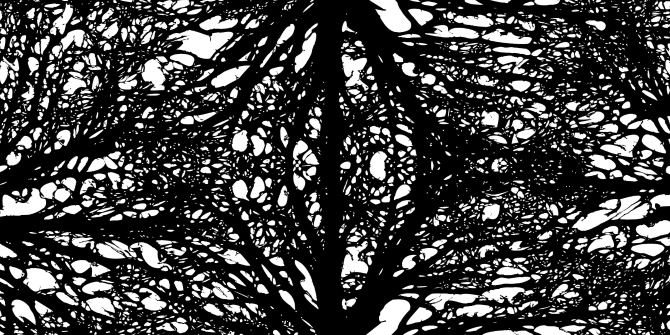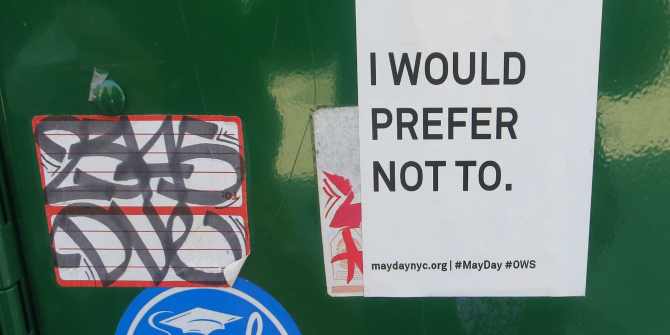In On the Inconvenience of Other People, Lauren Berlant explores the affective states bound up in being inevitably in relation with and attached to others – not just people, but animals, things and thoughts. Berlant’s bequest with this last book is a thought experiment in how to proceed in brokenness and do theory in a damaged world, writes Lilly Markaki.
On the Inconvenience of Other People. Lauren Berlant. Duke University Press. 2022.
 Find this book (affiliate link):
Find this book (affiliate link):![]()
‘Hell is other people, if you are lucky,’ opens the Introduction to Lauren Berlant’s latest, and sadly last work, On The Inconvenience of Other People. Completed in summer 2021 during the COVID-19 pandemic, the book thinks through what Berlant describes as the overcloseness of the world – the sense and many genres of friction that living with others (not just people but ‘animals, things, and thoughts’ too) to whom we are and are not attached unavoidably brings with it. The book’s key concept of ‘inconvenience’ is Berlant’s other name for this, aimed at capturing the affective state – encompassing ‘everyday aversion, adjustment, minor resistance and exhaustion’ – ensuing from being in relation, and which we have no choice but to process. ‘Mostly, other people are not hell. Mostly, people are inconvenient. ‘‘They’’ includes you.’
More than a feeling or prospect, inconvenience, for Berlant, is a drive – we, however ambivalently, seek to be inconvenienced, insofar as we desire to be with other people and in the world. Inconvenience, then, ‘registers one’s implication in the pressures of coexistence’. That we are not, have never been, sovereign is one of Berlant’s critical lessons in this book. To pay attention to inconvenience, in its ordinary and life-shaping capacities, is to disturb the fantasy of autonomy, permeating ‘the liberal colonial state and the citizenship subjectivity shaped by it’. It is also to ask about ‘how the vertical hierarchies of privilege capture and recast the tone of ordinary social frictions to naturalize, weaponize, and calcify a self-interested/projective dynamic’. Attuning with Black and queer theory, Berlant thinks inconvenience as biopolitical drama beyond the (im)personal, pointing to the way certain populations or figures are inconvenient to the reproduction of power or ‘the general supremacist happiness’.
To be queer, to be Black, for Berlant, is to know oneself as inconvenient – ‘there is no getting beyond it, only dealing with it as a form of life you live with’. But it is here also that another kind of happiness or its promise – ‘a loose assemblage of emerging lifeworlds’ – are to be located. Attending to such heterotopias, capable of disturbing the ‘it is what it is’ assurance that saturates our impaired sociality, On The Inconvenience of Other People promotes thought experiments in world-building that take non-sovereign relationality as their starting point: ‘If there is an inconvenience drive, can consciousness of it become a resource for building solidarity and alliance across ambivalence, rather than appearing mainly as the negative sandpaper of sociality? Is it possible to turn ambivalence from the atmosphere of negativity it currently brings with it into a genuinely conflicted experience that allows us to face up to the phenomenality of self-disturbance in the space of coexistence and even the desire to let in particular objects, or to protect them once they’ve gotten under the skin?’
 Stephanie Brooks, Lovely Caution, 2010. Colour photograph. Reproduced with permission of Stephanie Brooks.
Stephanie Brooks, Lovely Caution, 2010. Colour photograph. Reproduced with permission of Stephanie Brooks.
Already offered in the Introduction, like all key conceptual ‘riffings’ in the book, this guiding question underlies Berlant’s three main chapters ‘on things we want but not surely – sex, democracy, and a better world for the life we want to be in’. The chapters read inconvenience in and with aesthetic events spanning the last five decades. The space afforded this review does not allow for an analysis of these chapters (or Berlant’s coda) in their totality: instead, I highlight what I take to be some of its most exciting aspects.
Among these is Berlant’s recovery of sex in Chapter One as an object worthy of critical attention and which carries implications for the social. Sexual contact is important to think with, for Berlant, because it ‘intensifies the enigma of the situation of nonsovereign sociality’. As a privileged site of ambivalent proximity, sex allows us to try out diverse modes of coexistence. Berlant’s analysis, it should be noted, focuses on sex in the event of happiness, or, more minimally, sex that is shared, which is to say wanted. Still, ‘when one consents to something sexual, one is consenting to a thing that’s about to happen, not a thing whose narrative, affective, or sensual shape one holds with assurance.’ The threatening dimension of sex is always there, co-present with the promise of happiness that intimacy brings with it.
This is why sex, like politics, is inherently optimistic for Berlant. Optimistic, of course, does not always mean good. ‘Optimism is often unbearable,’ Berlant remind us. ‘The optimism that sex tends to trigger is for an impossible state of things: the perfect rhythm of being in and out of control, of being open and closed in the right or bearable ways, achieving a smooth, unambivalent holding environment for our own and the world’s coherence.’
Moreover, the pervasiveness of sexual violence, and the ensuing atmosphere that haunts sex in the present, makes its optimism difficult to carry. Berlant’s effort becomes about distinguishing between what they term the disturbance of sex, which can be generative, and sex’s trauma. This helps explain their decision to think here with Bernardo Bertolucci’s controversial film, Last Tango in Paris (1972). ‘Hardly an ideal representation of sex in the event of happiness’, the film ‘performs the necessity of thinking social, political, and sexual nonsovereignty to social theory […] it stages as acutely as anything does the problem of how to lose one’s object worlds and the attachment habits that keep it going, while maintaining attachment to what else social relations can do’. This chapter is a compelling essay focused on sex’s life-making potential beyond reproduction, or about ‘how sex hinges the broken and the disturbed for and against the better world’.
This first chapter of the book also initiates us to what, for me, is one of Berlant’s most immediate bequests with this work: the episodic as a way to stay with what of life falls outside the scale of the event. Like the intimacy scenes in Last Tango in Paris, and the affective structure of inconvenience itself, ordinary encounters, for Berlant, are essentially ambivalent. The episodic is their solution for the form or tempo proper to such happenings; it ‘denotes a situation that takes time, that rises and falls in intensity and consequence, that may be forgettable until it emerges later, in a series. It might become an episode. It might become an event that reshapes a life or a world. But it prefigures nothing.’
Coupled with the elliptical (signalling a living out of joint), the episodic runs through Berlant’s third chapter, exploring dissociative poetics and suicidiation as ‘another way of thinking about object loss’ beyond the negative. Writing of Claudia Rankine’s lyric essay Don’t Let Me Be Lonely (2004), Berlant notes how the work records ‘scenes to be in the middle of’. Life and narrative continuity are here fractured by trauma – though not that of 9/11, which is Rankine’s apparent historical frame. Instead, ‘it’s Black life, it’s the body’s life, it’s the intimate mediation called American life roiling from living through what is also not lived through’.
Rankine’s book, Berlant argues, compels us to inhabit America’s sociality of loneliness. Dissociation emerges as simultaneously symptom and cure, ‘a practice for survival’ that does not preclude hope. ‘What do we mean to each other? What does a life mean? Why are we here if not for each other?’ Borrowed from Rankine, these lines perform Berlant’s own searching in On The Inconvenience of Other People for better objects to attach oneself to and ultimately – why not? – a better world.
A book about proceeding in brokenness, On The Inconvenience of Other People is simultaneously an experiment, if not a map, on how to do theory in a damaged world. Throughout it, Berlant writes in what they term ‘a parenthetical voice’. Like the modes of the episodic and the elliptical, this voice proceeds uncertainly, while ‘limiting the sneaky ways em dashes, notes, and other modes of insertion’ to avoid a hierarchical organisation of thought and of reading. Preferring spontaneity and the immediacy of the visceral, the voice gives rise to a collection of ‘assays’ that are open-ended, inviting re-writing, continuation and improvement. Destined to be Berlant’s last book, On The Inconvenience of Other People is not their final contribution then. They have left us how the book begins – in the middle of life, asking that we pick it up and change what the object is and can do.
Note: This review gives the views of the author, and not the position of the LSE Review of Books blog, or of the London School of Economics and Political Science. The LSE RB blog may receive a small commission if you choose to make a purchase through the above Amazon affiliate link. This is entirely independent of the coverage of the book on LSE Review of Books.
Thank you to Stephanie Brooks to use a photograph of Lovely Caution in the piece. This image should not be reused without permission.






